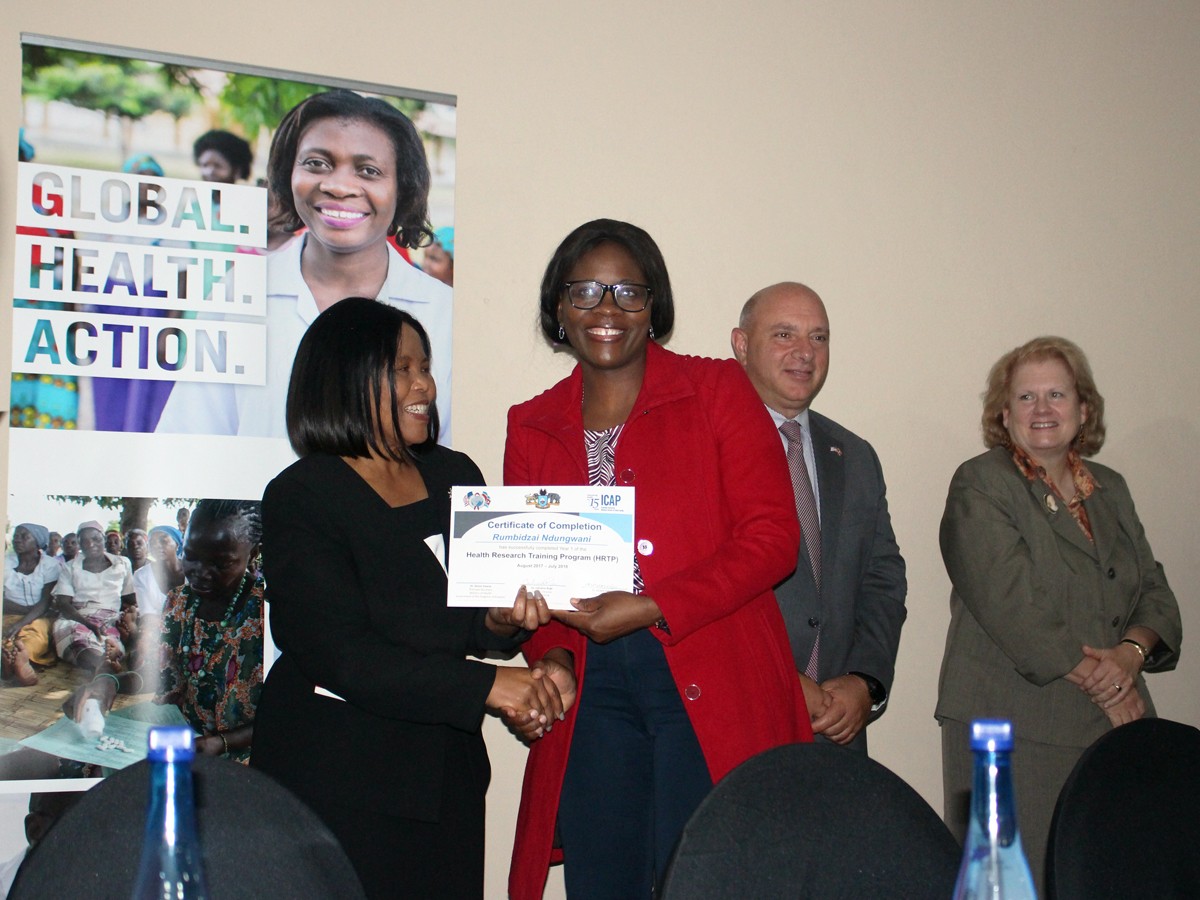After five years training the next generation of researchers in Eswatini, ICAP’s Health Research Training Program (HRTP) celebrated its most recent cohort of fellows with a research summit and graduation ceremony on November 27, 2018 in Ezulwini, just south of the kingdom’s capital, Mbabane.
Newly appointed Minister of Health Lizzy Nkosi gave the keynote address at the event, which also welcomed Rejoice Nkambule, deputy director of health services for the Eswatini Ministry of Health, Khanya Mabuza, MPH, director of the National Emergency Response Council on HIV and AIDS (NERCHA), Caroline Ryan, MD, MPH, Eswatini country director for the U.S. Centers for Disease Control and Prevention / President’s Emergency Plan for AIDS Relief (CDC/PEPFAR), and Michael Lombardo, deputy chief of mission for the U.S. Embassy in Eswatini.
The event honored the Cohort 5 fellows and the dedicated mentors who made HRTP such a success, and included updates from past fellows on their activities and accomplishments since graduating from the program. The highlight of the event, however, was the poster showcase featuring the culmination of a full year of learning and effort on the part of each of the ten Cohort 5 fellows.
This year, all research projects focused on the Swaziland HIV Incidence Measurement Survey 2 (SHIMS2) data, which were released in July 2017 and showed Eswatini’s remarkable progress toward HIV epidemic control. The availability of this robust dataset gave the Cohort 5 fellows the opportunity to perform a variety of secondary analyses—on topics ranging from predictors of HIV status disclosure, determinants of HIV prevalence among adults, impact of HIV status on duration of breastfeeding, and willingness to test and start HIV treatment—and thereby contribute to evidence-based policy and program recommendations on HIV in their country.
“The fellows’ work will help increase our understanding of SHIMS2 data,” said Harriet Nuwagaba-Biribonwoha, MD, PhD, research director for ICAP in Eswatini and principal investigator of the CDC/PEPFAR health systems strengthening award that supports HRTP. “We are grateful for the fellows’ contributions and look forward to seeing their research analysis translated into effective policies and programs.”
Over the five years, a total of 40 fellows participated in HRTP. The majority of those in Cohorts 1 to 4 who completed the one-year training program have continued to individual research projects, and nearly half have participated as co-investigators on local and international protocols. Through HRTP, nine fellows have applied and been accepted for advanced research training, including four master’s and five PhD programs.
In addition, HRTP fellows have presented their research at local and international conferences, including Cohort 2 fellow Bonisile Sibandze, who was among the best two poster presenters at the 2016 NERCHA pre-International AIDS Conference (IAS) conference and won a full scholarship to attend IAS Durban 2016.
“We have seen that the quality of research studies carried out in the country has improved since we started implementing HRTP, and it has increased the interest in conducting research,” said Zandile Mnisi, MPH, manager of the Health Research Unit of the Ministry of Health, who is on the HRTP board. “Some fellows have even gone to the extent of publishing their work, presenting at international conferences, and participating in the development of guidelines where they have been required to offer scientific evidence.”
HRTP is part of ICAP’s Strengthening National Epidemiologic and Research Capacity to Improve Health Outcomes project, funded by PEPFAR through the CDC. This project supports the national Health Research Unit (HRU) in its mandate to plan, promote, and coordinate research in Eswatini for the purpose of generating and utilizing evidence for planning and delivering health services.
The goal of the fellowship program is to train young researchers from diverse health- and science-related fields, in order to strengthen key components of the health systems and health workforce in Eswatini. Each training year in HRTP has included a series of didactic and practical sessions on a variety of research topics, including identifying a research question, literature review, quantitative and qualitative research methods, good clinical practice, study implementation, data analysis, and scientific writing.
“HRTP was a rigorous and strenuous exercise,” said Sizakele Dlamini, a lecturer at Christian University, who was part of Cohort 4. “In the process, it was cultivating us to be good researchers. It gave us the ability to think about things differently, taking us and our thinking to new heights.”
“I liked the mentorship program because we were trained by experienced people, who are well published and rich with knowledge and information,” said Mandzisi Mkhontfo, a technical advisor at University Research Co., LLC (URC), who was part of Cohort 5. “My country director appreciates the experience I am now bringing, and attributes that to my participation in the HRTP program.”
The following video celebrates the program’s fifth year and presents reflections from participants, mentors, and board members on their experiences.
A global health leader since 2003, ICAP was founded at Columbia University with one overarching goal: to improve the health of families and communities. Together with its partners—ministries of health, large multilaterals, health care providers, and patients—ICAP strives for a world where health is available to all. To date, ICAP has addressed major public health challenges and the needs of local health systems through 6,000 sites across 30 countries. For more information about ICAP, visit: icap.columbia.edu









